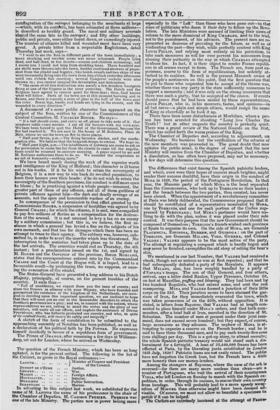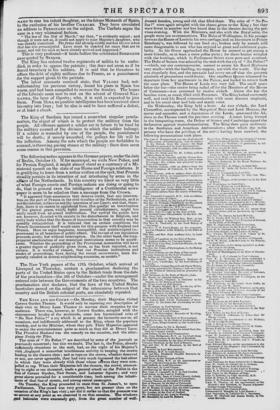The differences that exist among the Spanish patriotic leaders, and
which, even were their hopes of success much brighter, might render their success doubtful, have their origin in the conduct of MINA in 1826, the period of the Portuguese Revolution. In that year, the Masonic party of which MINA is the head separated from the Communeros, who look up to TORRIJOS as their leader; and the breach between the two parties, thus created, has never been closed. When the appointment of a revolutionary committee at Paris was lately deliberated, the Communeros proposed that it should be constituted of a representative nominated by MINA, one by TORRIJOS, and one for each portion of the Cortes sup- pressed by FERDINAND ; but Misrn's partisans would have no- thing to do with the plan, unless it was placed under their sole control. It was their purpose that the new Government should be composed of themselves ; TORRIJOS's friends wished each province of Spain to organize its own. On the side of MINA, are Generals PLACENCIA, ESPINOSA, BURREN, and GUIROGA : on the part of ToaniJos, are Generals MILANS, Via°, GURREA, and Colonel Vial= ; VALDEZ appears to be the most active of the party. The attempt at regulating a conquest which is hardly begun and may never be finished, exemplifies the old story of selling the bear's skin.
We mentioned in our last Number, that VALDEZ had received a check, though not so serious as was at first reported ; and that he had subsequently defeated a party of the Royalists. It appears that MILANS, also, has been roughly handled by a party of d'EsPmen's troops. The son of -that General, and four others, arrived, says a letter dated Baulon, Upper Pyrenees, October 20, on foot at Maurillas, puffing and blowing. They had been met by two hundred Royalists, who had sabred some, and sent the rest scampering. MINA and VALDEZ formed a junction of their little corps on the 23d. Their junction seems to have alarmed the gar- rison of Iran, for they immediately evacuated the town, which was taken possession of on the 25th, without opposition. It is stated, in letters from Bayonne, that VALDEZ had at length con- sented to place himself under MINA'S orders, and that both om- manders, after a brief halt at Irun, marched in the direction o St. Sebastian. The number of men at present under their joint om- mand, does not exceed seven hundred ; but they expect,.of course, large accessions as they advance. The nephew of MINA is at- tempting to organize a reserve on the French border; and he is said to have three thousand men, and to pay each twenty-five sous (one shilling) per day. This is a got-up story, to attract recruits; the whole Spanish patriotic treasury would not stand' such a dis- bursement for a fortnight. A loan of 32,400,000 francs has been effected at Paris, by the liberating junta established in London 16th July, 1830 ! Patriotic loans are not easily raised. The publics have not forgotten the Greek loan, but the French have a little more honesty than our money-lenders. . Among the strangers at Bayonne, where the case of the ark is reversed—for there are many more unclean than dean—are a number of Portuguese, who wait the arrival of their countryman VIGIL, who left London on Sunday to march with the Spanish ex- pedition, in order, through its success, to rescue their own country from bondage. This will probably lead to a more speedy neeog- nition of Mann. than otherwise might have been deemed ad- visable: Of course, we must not allow so beautiful a specimen to perislrif it can be helped.- , The Carlists are extreinely. ineeirsed at the attempt of FairtitS NAND to rear his infant-daughter, as the fliture Monarch of Spain, to the exclusion of his brother CHARLES. They' have circulated an address to FERDINAND on the subject. The Carlists argue the case in a very whimsical fashion.
" The law of the 31st of March," say they, " is evidently unjust ; and though it were not so, it could not apply to your Majesty's daughter, who was already conceived. The ftetus had already visibly marked the sex when that law was promulgated. Laws must be enacted for cases that are to come, and not for such as have already arrived and happened."
This is very profound—it beats hollow the celebrated SORBONNE Lase quoted by STERNE. The King has ordered twelve regiments of militia to be embo- died, in order to oppose the patriots ; this does not seem as if he feared treachery in his soldiers. It is said that he threatens to efface the debt of eighty millions due to France, as a punishment for the support given to the patriots. The latest accounts received state, that VALDEZ had, not- -withstanding his previous victory, found his place in Spain too warm, and had been compelled.to recross the frontier. The hopes of the Liberals seem now to rest on the advent of General SA L- DANHA, the hero of Oporto ; who, it is said, is expected to join them. From MINA no positive intelligence has been received since his entry into Irun ; but he also is said to have suffered a defeat, or at least a cheek.



























 Previous page
Previous page